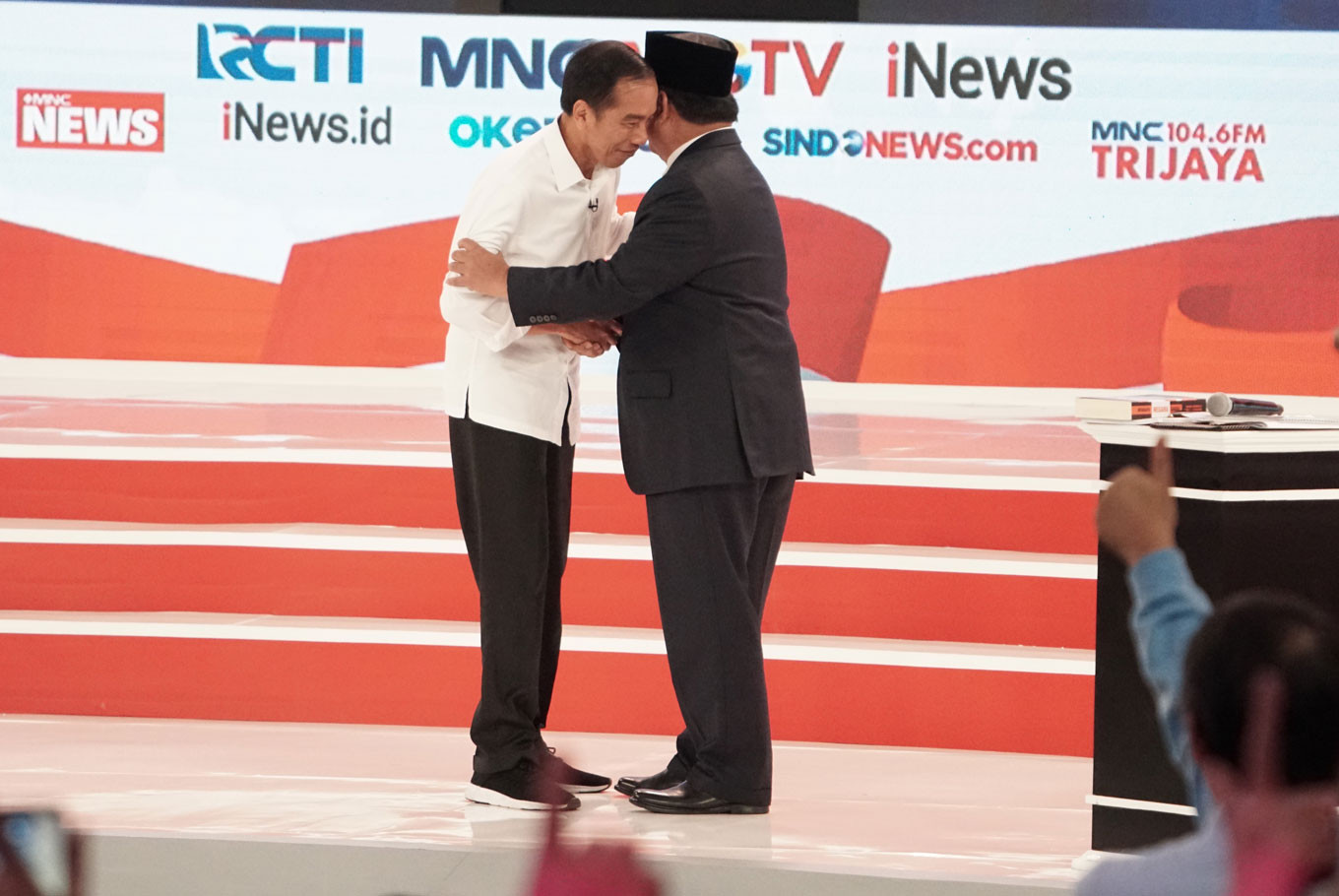The Jakarta Post
Jakarta / Tue, February 19, 2019 / 08:47 am
 Warm ending: Presidential candidate Joko “Jokowi” Widodo (left) embraces his contender, Prabowo Subianto, after the 2019 presidential candidate debate at Hotel Sultan in Jakarta on Sunday. The debate was focused on energy and food, natural resources and environment as well as infrastructure. (JP/Donny Fernando)
Warm ending: Presidential candidate Joko “Jokowi” Widodo (left) embraces his contender, Prabowo Subianto, after the 2019 presidential candidate debate at Hotel Sultan in Jakarta on Sunday. The debate was focused on energy and food, natural resources and environment as well as infrastructure. (JP/Donny Fernando)
The second round of presidential debates on Sunday evening was livelier than the first one last month, with the exchanges of views flowing smoothly. But the debates miserably failed to generate a battle for great ideas because of the inadequate time allotted for discussing five important topics and the poorly designed structure of the debates.
Yet more unfortunate, many of the questions prepared by the eight panelists, especially on energy and food, were not relevant to Indonesia’s most pressing problems within the next five to 10 years.
The panelists miserably failed to force the candidates to state their visions and missions, views, stances and commitments in regard to the five topics of discussion: food, energy, natural resources, the environment and infrastructure.
But then again, given that the candidates were each only given a three-minute introduction, how could they adequately explain their visions and missions in such important sectors?
Certainly, Joko “Jokowi” Widodo, who has the benefits of incumbency, immediately moved to show off his achievements over the past four years. As the challenger, Prabowo Subianto could only state his dream: to achieve self-sufficiency in energy and food and lower their prices and improve the terms of trade for farmers.
So important are energy and food to a nation that they could make or break the political and economic stability of a country like Indonesia, which has a population of 270 million spread out in the world’s largest archipelago.
Yet the first question raised by the panelists on these two issues was: “How can the fourth industrial revolution [Industry 4.0] impact energy and food development?”
Even though Industry 4.0 has reached Indonesia, the issue is not the most urgent problem for the country’s energy policy now and for the next 10 years.
They should have asked the candidates about their commitment to cutting the huge amount of wasteful spending on fuel subsidies and developing renewable energy: geothermal, solar, wind, biomass, biofuel and hydropower.
Citing only the increased use of palm oil-based biodiesel as an example of successful renewable development is simplifying the whole spectrum of renewable energy development.
The general public eagerly wanted to know the stance of each candidate on the fuel subsidy, which had held hostage all previous presidents as they had always been torn between their wish to embrace market pricing for fuels and their desire to remain in power.
Jokowi made a nationally and internationally commended bold move to slash fuel subsidies at the outset of his administration in late 2014, only because international prices had collapsed to below US$40 per barrel.
He pledged to float domestic fuel prices on international oil prices as Indonesia is already dependent on imports for almost 60 percent of its needs. The managed fuel price-floating system Jokowi introduced in 2015 was still tied to fixed price floors and ceilings, whereby the government could still intervene in retail fuel prices if fuels overshot the price ceiling.
As the range of the price floors and ceilings set for the managed floating was designed to be close to the fuel economic costs, the policy also was effective at least to prevent subsidies from ballooning out of control.
Such a system would also allow a gradual incremental rise in fuel prices and would free the government from being held hostage by a wildly volatile international oil market.
But Jokowi is no different from his predecessors. Last year, he reneged on this commitment when oil prices rose to between $70 and $80, a policy he defended as most imperative to prevent inflationary pressures and to protect the purchasing power of the people.
But the blunt fact is that the drawbacks of fuel subsidies and government-regulated fuel prices have been well-documented: They are known to benefit the rich disproportionately, as they consume much more energy and they lead to wasteful consumption and environmental degradation by disincentivizing energy efficiency, conservation and the development of renewable energy.
Subsidies also distort the price signals that normally balance the supply and demand in a market, foster smuggling of cheaper fuel to higher-paying markets and tie up government funds that could be better used in areas such as infrastructure, education and health care.
Energy subsidies increased from Rp 93 trillion ($6.8 billion) in 2016 to Rp 98 trillion in 2017 and totaled Rp 165 trillion in 2018 as the oil price rose to as high as $70 from $48 as set in the budget. For this year, they are targeted at Rp 158 trillion with an average oil price of $70.
Likewise, one of the basic questions that should have been raised on the food issue is: How do the candidates define the meaning of food security or food self-sufficiency, set against the gradual shifts in the patterns of food consumption? And what is their strategy for increasing the production of such staple food as rice, corn, potato, soybean and horticulture, whose imports tend to increase annually during the Ramadan fasting month and Idul Fitri festivities?
Past experiences have shown that food self-sufficiency does not fully address the core elements of food security because of the vulnerability of crops to weather anomalies and pest attacks.
Moreover, income growth, demographic and other lifestyle changes have been causing structural shifts in the patterns of domestic food consumption and expenditure, especially in urban areas that now account for around 50 percent of the population.



0 comments:
Post a Comment